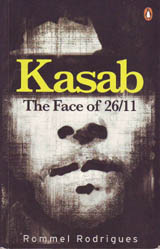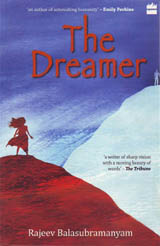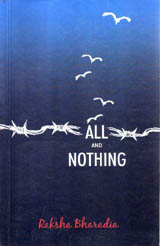|
Short Takes
Of terrorism, love and relationships
Reviewed by Randeep Wadehra
Kasab: The Face of 26/11
by Rommel Rodrigues
Penguin.
Pages xii+276. Rs 299.
 AJMAL
Kasab is the only Pakistani terrorist of the 26/11 notoriety to
claim the dubious distinction of having become the "face" of
terror. He was taken alive by our security forces. Ever since his
arrest, he has been evoking curiosity regarding his social background,
and the methods used to indoctrinate him into believing in the rightness
of a palpably reprehensible action, etc. AJMAL
Kasab is the only Pakistani terrorist of the 26/11 notoriety to
claim the dubious distinction of having become the "face" of
terror. He was taken alive by our security forces. Ever since his
arrest, he has been evoking curiosity regarding his social background,
and the methods used to indoctrinate him into believing in the rightness
of a palpably reprehensible action, etc.
Ajmal Kasab comes from
the gun-fodder class of jihadists; uneducated and unskilled, they have
very few avenues of employment open to them. Poverty precludes any
possibility for dignified sustenance. When they see the wealth being
flaunted by their more fortunate compatriots they, naturally, become
susceptible to get rich quick offers. In the process, they get ensnared
by those having vested interest in perpetuating jihadist culture in
Pakistan and beyond. Rodrigues investigates the dynamics of a
fundamentalist society – which routinely produces brainwashed killers
– in all its stark details. Not only does he identify various persons,
institutions and places in Pakistan which are involved in churning out
jihadist desperados but has also delineated the actual process of doing
so. This seminal work might well prove to be a template for similar
studies in future.
The Dreamer
By Rajeev Balasubramanyam.
HarperCollins.
Pages 314. Rs 299.
 Shashi
is an actor who, apart from being a regular on the London theatre
circuit, has performed a negative character in a big-budgeted Hollywood
movie; but becomes famous for playing a character named Tony Shah on
television. Inexplicably, he loses interest in his work, turns alcoholic
and violent. As a result, his marriage and career go to seed. Gradually,
he seeks relief for his tormented soul by hallucinating. You learn of
his love for Lisha when he was a kid in Stonewall – a village in
Lancashire. Lisha dies in a racist attack that burns her house down.
Shashi is disturbed by other memories, too. As a child, he had witnessed
adulterous relationships between his mother and Lisha’s father, as
also his brother and Lisha’s mother; later, as adult he sleeps with
his best friend’s wife. The narrative swings between past and present
– nightmares and lucidity. Shashi
is an actor who, apart from being a regular on the London theatre
circuit, has performed a negative character in a big-budgeted Hollywood
movie; but becomes famous for playing a character named Tony Shah on
television. Inexplicably, he loses interest in his work, turns alcoholic
and violent. As a result, his marriage and career go to seed. Gradually,
he seeks relief for his tormented soul by hallucinating. You learn of
his love for Lisha when he was a kid in Stonewall – a village in
Lancashire. Lisha dies in a racist attack that burns her house down.
Shashi is disturbed by other memories, too. As a child, he had witnessed
adulterous relationships between his mother and Lisha’s father, as
also his brother and Lisha’s mother; later, as adult he sleeps with
his best friend’s wife. The narrative swings between past and present
– nightmares and lucidity.
Balasubramanyam has a
talent for inventing metaphors and similes that should add to the
readability of this work of magic realism written in smart prose.
However, after you finish reading it, you feel dissatisfied. The
tormented Shashi’s angst leaves you cold. There are simply too many
loose ends here. For example, what was the purpose of introducing the
comic book character ‘Stoneman’ if it had to remain in unfinished
form? Personally, I would have preferred a tighter plot.
All and Nothing
By Raksha Bharadia.
Rupa.
Pages: ix+223. Rs 95.
 Man-woman
relationship has always been a complex and contradictory phenomenon. It
constricts, liberalises, demeans and exalts the individuals even as they
stagnate or progress materially, intellectually and spiritually. Tina, a
talented artist, falls for the charms of Aditya, whose first wife Antara,
the-gold-digger, has walked out on him. After the initial euphoria
abates, mind-games begin; with Aditya ruthlessly reducing Tina to an
emotional wreck. Manas is hopelessly in love with Gayatri and loses her
when he becomes desperately over-possessive. Upasna’s husband employs
violence as a means of subjugating her. Poorvi, disappointed with her
intellectual boyfriend, goes in for conventional marriage and a life of
decadence and discontent. Kriya, a mediocre but rich fashion designer,
learns the art of manipulation from her father. Her ruthlessness drives
a talented colleague to suicide. Antara re-enters Aditya’s life,
triggering a catharsis in Tina’s psyche, forcing her into
self-reevaluation that impacts the mindsets and lives of others too. Man-woman
relationship has always been a complex and contradictory phenomenon. It
constricts, liberalises, demeans and exalts the individuals even as they
stagnate or progress materially, intellectually and spiritually. Tina, a
talented artist, falls for the charms of Aditya, whose first wife Antara,
the-gold-digger, has walked out on him. After the initial euphoria
abates, mind-games begin; with Aditya ruthlessly reducing Tina to an
emotional wreck. Manas is hopelessly in love with Gayatri and loses her
when he becomes desperately over-possessive. Upasna’s husband employs
violence as a means of subjugating her. Poorvi, disappointed with her
intellectual boyfriend, goes in for conventional marriage and a life of
decadence and discontent. Kriya, a mediocre but rich fashion designer,
learns the art of manipulation from her father. Her ruthlessness drives
a talented colleague to suicide. Antara re-enters Aditya’s life,
triggering a catharsis in Tina’s psyche, forcing her into
self-reevaluation that impacts the mindsets and lives of others too.
Bharadia uses fluid
narrative style to successfully deal with a multilayered theme.
|